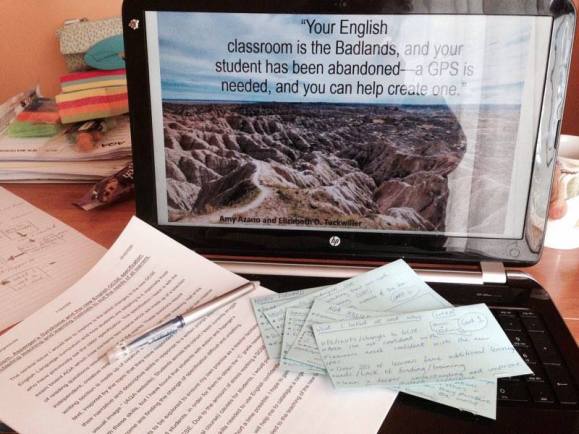This time last week the nerves were a’ rumbling as I did a last minute run-through of my specialist paper for my teaching conference, in order to pass my PGCE. In hindsight (and at the time) I realised how daft it was to be nervous. If I can talk in front of twenty disengaged plastering students for three hours on a Monday morning, surely facing a small group of media and humanities teachers is hardly an issue.
But for some reason, discussing our practice in front of our peers is daunting. Personally, I think it is the element of competition. Competition in teaching is a slippery subject and one that I am still getting my head around, therefore I shall digress (maybe after a few more years’ experience I will feel a little more confident discussing this).
Anyway, I woke up on the morning of the conference feeling crabby and slightly short-tempered. I thought the whole thing was going to drag and I felt underprepared. Plus I’d have to navigate my way through a very bleak and dismal Huddersfield town centre (Huddersfieldians, I’m so sorry) in my rusty Ford who is on her last legs (wheels?).
After a brisk walk to the campus and a brew things started to seem a bit more cheery. My conference group were lovely, a mixture of Media, Dance, Games Design and English teachers from a variety of backgrounds. Each teacher delivered their paper over a two-day period while we gave feedback and asked relevant questions. The presentations were broken up with lectures during both days (which gave me a huge, nostalgic flashback to my BA).
It was silly to be nervous. The conference was supportive, helpful and interesting. It was fantastic to work together to see what key themes influenced our pedagogy, many of the issues we are facing stretched across each discipline, causing a range of intellectual debates and discussion. There was plenty of good practice to be observed and some fantastic teaching ideas to take away. Just one example would be the idea of using visual cues for deaf students who are learning dance. I do not teach dance (God forbid), nor do I have any learners who are deaf, but the idea of visual cues would work fantastically well with my learners who have ASD.
Our tutor facilitated the conference in a way that was exceptionally supportive. I was involved in the discussion on the first day but during the second I remained a little more reserved as I was keen to take a note of the fantastic example set in regards to questioning. It was thoughtful, constructive and brought very nervous students out of their shell. The day was rich with excellent practice: from the tutor, the student teachers and guest lecturers. I realised that my dubious attitude towards it beforehand was probably to do with the lack of good training in my own facility, which is a real shame but I am determined to take in and maintain the important information I took from the conference.
I have just been telling a former colleague about the conference and decided to reflect afterwards, as I realised this has been another critical incident in my teaching career so far. Although I have a mountain of marking to do, oodles of admin and two assignments to finish, I feel so much more motivated and ready to take it on in the final term. I feel lucky to have had the pleasure to work with other teachers who are enthusiastic and who have been so supportive. They have shown an interest and openness, shared experiences, teaching methods, given advice and questioned constructively. In a time where teachers are leaving the profession in drones, even newly qualified teachers, I think it is extremely important that teachers support each other and motivate each other to be the best teacher they can be.
